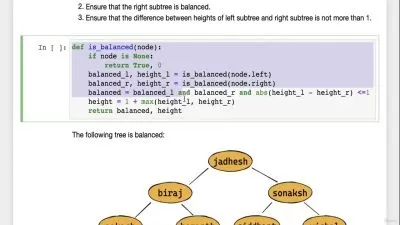About AlgorithmsLearn More
Think of algorithms as recipes for computational functions. Algorithms define specific procedures that use input to prompt a computer to take a specific action, ultimately creating output. Algorithms are vital to machine learning, data processing, and countless other programming practices.
Sort by:
Sorting
The newest
Most visited
Course time
Subtitle
Frequently asked questions about Algorithms
An algorithm is a step-by-step process or set of rules you outline to complete any given action. In mathematics and computer science, algorithms often get used to automate calculations. You do this by defining specific procedures for a computer to take when the user inputs a value—ultimately creating an output. Algorithms are vital to machine learning, data processing, and countless other programming practices. They also allow you to improve the efficiency, performance, speed, and scalability of your code or applications/programs. As a result, algorithms are often created and utilized by developers and software engineers.
Data structures organize and store data, making them one of the most fundamental ingredients in creating efficient algorithms and good software design. The ability to manage data also allows for efficient access and modification when programming. Knowledge of creating and designing solid data structures represents an essential skill to code successfully. A few examples of common data structures are arrays, a hierarchical tree, singly and doubly linked lists, stacks, and queues.
The time complexity of an algorithm refers to the amount of time it takes for the algorithm to process all steps, and the space complexity of an algorithm is the amount of memory the algorithm takes up. Knowing both is crucial in developing effective code, giving you insight into your algorithm efficiency and how you can alter it to make your program run smoothly without sacrificing any of the expected outputs.
Dynamic programming, or DP, is a topic in data structures and algorithms used for solving optimization problems by breaking a problem into smaller subproblems. Each of the problems gets solved just once; the solutions then get stored to avoid repetitive computations. Programmers should understand how to solve DP problems and apply that knowledge when building efficient DP algorithms. Taking a course focused on DP problems offers a practical way to acquire complete DP understanding and tricks. Most of the dynamic programming problems share some common elements; understanding how to identify those elements will further enhance your ability to develop new and more efficient algorithms.
There are six fundamental types of algorithms all aspiring and experienced programmers and software engineers should understand and know how to utilize: recursive, divide & conquer, dynamic programming, greedy, brute force, and backtracking. A divide-and-conquer algorithm recursively breaks down a problem into two or more sub-problems of the same or related type until these become simple enough to be solved directly. Greedy algorithms are used for solving optimization problems. A backtracking algorithm finds a solution to a problem in an incremental approach. Other examples of common computer algorithms you can learn about in a programming course include searching algorithms such as binary search, breadth search, depth search, and sorting algorithms such as bubble, selection, and merge sort.
Algorithms can help create applications that intelligently interact with the world around you, from building intelligent recommender systems to self-driving cars, robots, and chatbots. Machine learning is one of the most important areas of Artificial Intelligence or AI. Algorithms are particularly crucial in the fast-growing field of machine learning; in particular, algorithms can automatically detect patterns in data and assist with uncovering patterns to predict future data. For example, data scientists can use programming languages such as Python to analyze data, create visualizations, and use machine learning algorithms.
Software engineers, computer programmers, and developers at many companies around the world create and use algorithms. Algorithms play a role in all manner of computing and programming, serving critically in data analysis and machine learning. Understanding algorithms is essential to coding as algorithms are steps that can be converted into code using programming languages such as Java or C++. In addition, algorithms impact other industries such as the financial sector. For example, stock traders use algorithms to help make the best decisions when completing traders.
If applying for a position as a software engineer or developer, knowing how to create and use algorithms becomes crucial in preparing for a coding interview. Those preparing for an interview with a tech giant such as Google, Facebook, and TikTok should demonstrate a comprehensive understanding of algorithms and their development. Interviewers will very often ask candidates to write algorithms out in code in programming languages such as C++, Java, and Python. Common algorithms every aspiring software engineer, programmer, and developer should know before an interview are sort algorithms (merge sort and quick sort) and search algorithms (linear and binary), to name a few.







